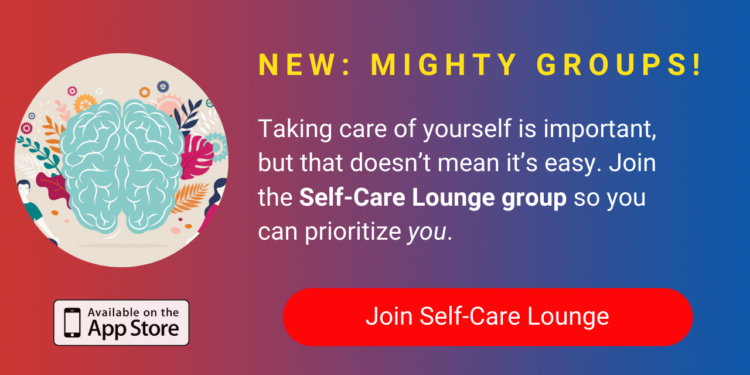How We Can Become Addicted to Avoidance With Depression
Editor's Note
If you experience suicidal thoughts or you or a loved one is affected by addiction, the following post could be triggering. You can contact SAMHSA’s hotline at 1-800-662-4357. You can contact the Crisis Text Line by texting “START” to 741741.
After attempting suicide when I was 15, I was sent to a mental hospital. The minimum stay in places like this is 72 hours, but I was at such a high risk of relapsing, they kept me for a month. Despite what many people might think, I had a blast. There’s never a dull moment in a mental hospital, and it’s filled with lots of interesting and amazing characters. I finally found a place where people had the same kinds of mental health problems I did. Most importantly, I‘d never met suicidal people before, so I fit in like dogs meeting at a park.
One of the first things that happen on introduction day is getting yourself signed up for meds. They have so many pills in storage, you could go swimming in them like a pool of gold coins, and your name was Scrooge McDuck. I learned all about antidepressants, antipsychotics, anti-this, anti-that, and everything in-between. I even learned how people liked to abuse medications.
Because of this, we had groups like Alcoholics Anonymous (AA) and Narcotics Anonymous (NA). I had no experience with substance abuse, so I sat back, relaxed and enjoyed the show. I learned all about the 12-step program, sponsors, sobriety chips and the value of having a higher power, which could be anything from a god to a dog.
During these meetings, people spoke about their history of usage and abusage, what kinds of rewards they got from using, their progress in recovery, their relapses, where they were now and where they wanted to go.
I found the whole thing fascinating and absorbed everything like a sponge. I didn’t have to speak in any of the meetings since my lack of experience was a perfectly valid excuse to stay silent. This was comfortable for me because even though I liked everyone in the group, I hated public speaking.
Public speaking in school always terrified me. The anxiety of having to go up in front of an audience and speak was so overwhelming, I would do anything to get out of it. Every time I was successful in avoiding it, I rewarded myself with peace and could relax.
Avoidance is a fantastic way to get out of a potentially dangerous situation. The reward of peace we receive when we convince ourselves we can’t do something can be so pleasurable, we quickly learn what a wonderful tool it is in making sure we don’t feel uncomfortable again. With this single, perfectly healthy defense mechanism, painful emotions like agitation, stress, fear and rejection are instantly eliminated. Unfortunately, any behavior that is repeated can become a habit, and habits that are abused can become addictions.
When we abuse avoidance, giving up on ourselves can become a learned response. We can become so addicted to its peace, we apply it to many facets of our lives. These facets could be any combination of behaviors such as not standing up for ourselves, not taking necessary risks in life, not approaching attractive people, not applying to good schools or jobs, not taking care of our physical well-being, not getting out of bed, not eating healthy, not being social, not facing rejection, not resisting the temptation to complain and not doing something when the odds are against us. We can negatively self-talk ourselves out of difficult things all the time because it’s safe and can make us feel good.
This bad habit is easy to develop since it provides a short-term reward (feeling good), but long-term consequences (poor mental and physical health). Inversely, good habits are hard to maintain since they create short-term consequences (sore after a workout, hungry when we diet, tired when we study), but long-term rewards (feeling good). Sometimes, people don’t make it to the long-term rewards of the good habits because it’s so easy to give up and get the short-term rewards of the bad ones, which are the same. However, giving up or avoiding something can develop into an addiction to believing we are helpless, hopeless and where the long-term consequence can be depression and maybe even suicide.
If you think you might be doing this to yourself, there are signs your mind might be manipulating you, which are important to examine. To make the necessary steps forward, try doing some of the things people in addiction groups do. First, admit you have a negative thinking problem. This will help you focus on building yourself instead of projecting your pain onto the world and blaming others.
Avoid toxic people. Just like how alcoholics and drug users get together, people with depression may do the same. Make sure the people you surround yourself with aren’t ones who complain all day long. Are they positive? Are they motivating? Do they push you to be all you can be, or do they enable you by allowing you to hate the world and engage in self-destructive behavior?
Maybe you need to distance yourself from the friends or family members with whom you normally spend your time engaging in harmful behavior. Unfortunately, maybe your best friends and romantic partners are those with when you abuse yourself most. Therefore, you might need to make the hard sacrifice of cutting them out of your life. A good substitute is getting a sponsor to call when you feel particularly negative and have the craving to indulge in something you know you shouldn’t.
Try to avoid situations that allow you to think negatively. For example, hours of meaningless online shopping reinforces the false sense of needing objects to fulfill you. Avoid triggering environments as well. This can be as simple as not going on social media to compare yourself to others.
When we repetitively engage in these harmful activities, it’s easy to condition ourselves into believing we are weak, powerless, not good enough, incapable, worthless, ugly, destined for failure or should be dead. However, once we start making these positive small changes, the bigger ones become easier to manage. Eventually, it becomes effortless to differentiate if a certain behavior is helpful or not and make the necessary changes to live our best lives.
Finally, when we commit to making these life changes, it’s important not to wait to start. If we do, it will probably take a lot longer. Similarly, if we say we have a long-term relationship with depression or negative thinking, it will take at least a “long term” to stop, but probably longer. Fortunately, once we expose the problem, we can cut it off at the source and start changing today.
Unsplash image by Tobias Tullius


